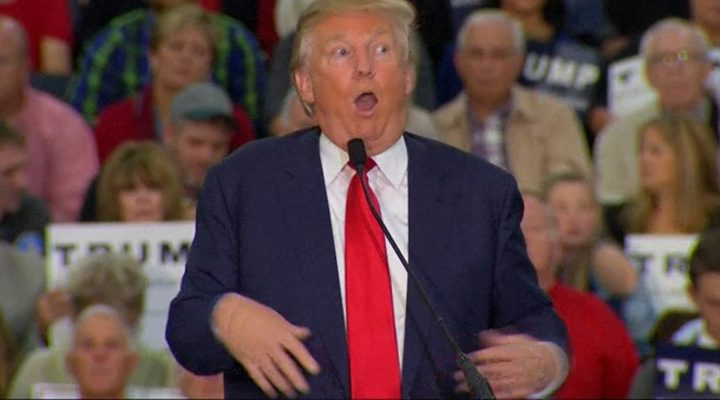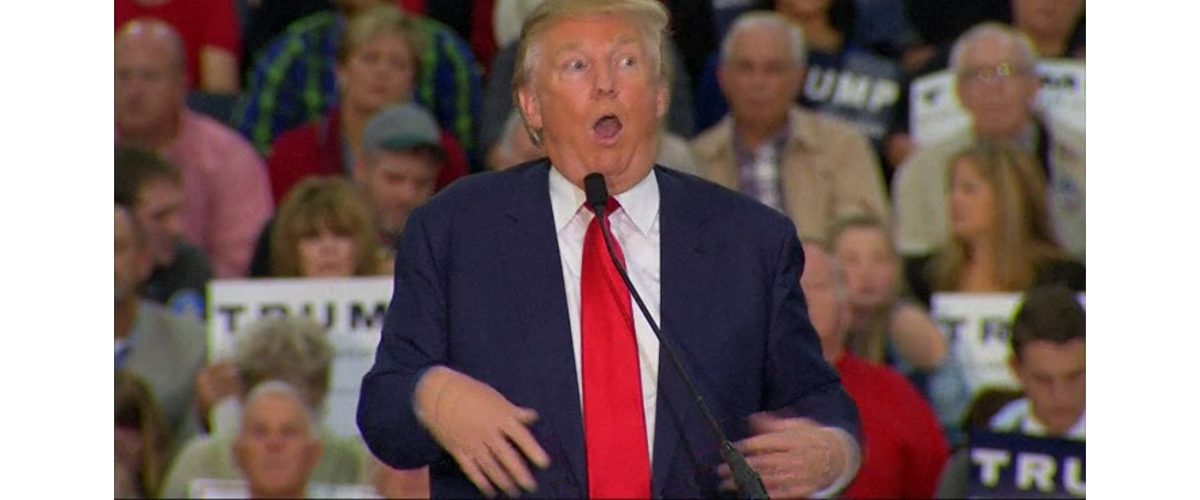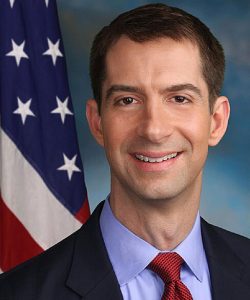The First Amendment to the Constitution of the United States can’t stay off the political hot seat. There’s a bill now before the U.S. Senate, known as the PRESS Act — the Protect Reporters from Exploitative State Spying Act — that would prevent the government from forcing journalists to reveal their sources.
There doesn’t seem to be anything dangerous in the bill. The House of Representatives, in a rare display of nonpartisanship, approved the bill on a voice vote.
Neither does the First Amendment appear to invite confusion or hostility. Thomas Jefferson, author of the First Amendment, said: “Our liberty depends on the freedom of the press, and that cannot be limited without being lost.”
“Our liberty depends on the freedom of the press, and that cannot be limited without being lost.”
Now, Sen. Tom Cotton, R-Ark., has blocked the Senate from passing the bill, contending the legislation could put national security in jeopardy. Cotton would be helped by a remedial course from the author of the First Amendment: “Where the press is free and every man able to read, all is safe.”
Eschewing evidence for emotion, Cotton attacked the media as “liberal.”
“The liberal media doesn’t deserve more protections,” Cotton declared during a brief speech on the Senate floor. “The press badge doesn’t make you better than the rest of America or put you above the law.” This, of course, isn’t about a rational commitment on his part to any policy, and it has absolutely nothing to do with the bill’s purpose in protecting all media from undue government pressure.
Cotton claimed: “For several years, the media has conducted itself in a disgraceful manner and destroyed its reputation with the American people. Yet some in Congress, maybe the only institution less popular than the press, now want to give it more privileges.”
Somehow Cotton ignores the stellar record of outstanding reporting done by the daily newspapers in America since our founding. The New York Times, for instance, has won 133 Pulitzer Prizes from 1918 to 2018. This is not disgraceful reporting.
It’s open season on the press
While politicians often have complex and adversarial relations with the press, no president or party ever has made such an “enemy of the state” out of the press as Donald Trump, who has made attacks on the press a major part of the Republican Party platform.
Trump has filed a lawsuit against CBS over its 60 Minutes interview with Kamala Harris. He frequently threatens to strip broadcasters of their licenses. At least 15 times he has argued television networks should have their licenses revoked because they criticized him. Between Sept. 1 and Oct. 24, Reporters Without Borders found Trump insulted, attacked, or threatened the press at least 108 times.
Last week, ABC News shocked the world by agreeing to a $15 million settlement with Trump, who complained news personality George Stephanopoulos defamed him by saying a jury had found Trump guilty of “rape” of E. Jean Carroll while the jury found him guilty and ordered him to pay a judgment of $83.3 million to her for defamation based on a finding that the once and future president had sexually abused her.
Trump, the convicted sexual abuser, liar and defamer, does not want to be known as a “rapist,” even though 69 womenhave accused him of various forms of sexual assault, from harassment to attempted rape.
The settlement with ABC News will add yet another layer of preemptive caution in truth telling on the abuse Trump has and will perpetuate. It is staggering that the most notorious liar ever to inhabit the White House can extract a $15 million settlement from a national news organization because he says they lied about his lying.
“To get me, somebody would have to shoot through the fake news. And I don’t mind that so much.”
Less than 48 hours before election day, Trump told a rally of his supporters he wouldn’t mind if someone shot the journalists in front of him. “I have this piece of glass here, but all we have really over here is the fake news. And to get me, somebody would have to shoot through the fake news. And I don’t mind that so much,” he said.
American trust in the media has dropped from a high of 72% in the 1970s, according to Gallup, to a current low of 32%. This is not an indication that reporters are lazy, incompetent, ignorant or a bunch of liars. It is the result of relentless “propaganda” spread by Trump and MAGA and his surrogates.
How did we go so quickly from freedom of the press to “fake news” in America? How did we go from trusting the press to hold our politicians accountable to a ragtag bunch of politicians who are liars, frauds and unaccountable to anyone?
The words of Thomas Paine spring to mind: “I become irritated at the attempt to govern mankind by force and fraud, as if they were all knaves and fools.”
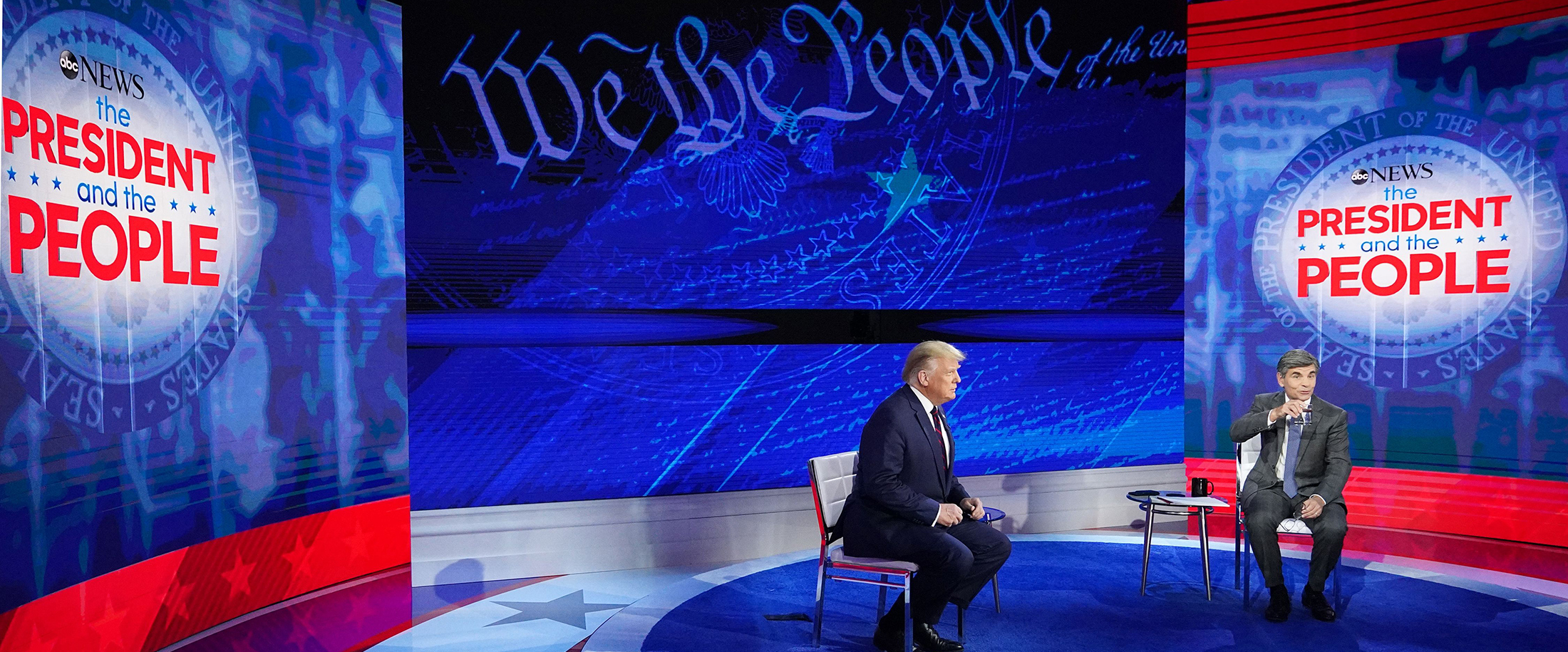
Donald Trump sits with ABC New anchor George Stephanopoulos for a town hall event at the National Constitution Center in Philadelphia on Sept. 15, 2020. (Photo by MANDEL NGAN/AFP via Getty Images)
The threat is real
Political attacks on U.S.-based journalists and news organizations pose an unprecedented threat to their safety and the integrity of information.
A survey from the International Center for Journalists highlights a disturbing tolerance for political bullying of the press in the land of the First Amendment. The findings show this is especially true among white male Republican voters.
The ICFJ’s survey found more than one-quarter (27%) of the Americans polled said they had often seen or heard a journalist being threatened, harassed or abused online. And more than one-third (34%) said they believe it is appropriate for senior politicians and government officials to criticize journalists and news organizations.
Yamiche Alcindor, the PBS NewsHour presidential affairs correspondent, interviewed Francois Pierre-Louis, whose parents brought him from Haiti in the 1970s. Pierre-Louis observed, “The American public doesn’t understand that democracy is a fragile system that can wither away if you don’t take care of it.”
“The American public doesn’t understand that democracy is a fragile system that can wither away if you don’t take care of it.”
Perhaps Americans are not aware of the spread of authoritarian and demagogic rulers in the rest of the world.
Freedom House, in its “Freedom in the World 2021” report, raised the alarm: “Even before 2020, Trump had presided over an accelerating decline in U.S. freedom scores, driven in part by corruption and conflicts of interest in the administration.”
Moreover, around the world more countries had performed worse on various measures of freedom than had improved compared to any other point since 2005. Democracy itself, Freedom House observed, had been rendered vulnerable.
“The expansion of authoritarian rule, combined with fading and inconsistent presence of major democracies on the international stage, has had tangible effects on human life and security,” they concluded.
Put as starkly as I know how: An attack on the freedom of the press is an attack on democracy.
According to the 2023 World Press Freedom Index — which evaluates the environment for journalism in 180 countries and territories and is published on World Press Freedom Day — the situation is “very serious” in 31 countries, “difficult” in 42, “problematic” in 55, and “good” or “satisfactory” in 52 countries. In other words, the environment for journalism is “bad” in seven out of 10 countries and satisfactory in only three out of 10.
“Attacks on a free press are of particular importance, because the first institution an autocratic demagogue takes control of is the press.”
For the sake of comparison relevant to the USA and the authoritarian rulers Trump emulates and worships, Russia ranks No. 148 and Hungary No. 85. The United States, which always has prided herself on being the leading democracy in the world, now ranks No. 32.
Attacks on a free press are of particular importance, because the first institution an autocratic demagogue takes control of is the press.
Viktor Orban and Hungary
Thwarting the free press was Victor Orban’s first move in taking control of the government of Hungary. Orban, a rightwing hero among American conservatives, has been labeled a “press freedom predator” by RSF.
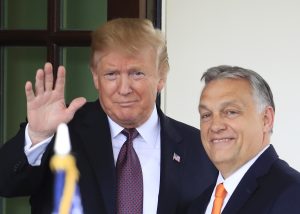
On May 13, 2019, Donald Trump welcomes Hungarian Prime Minister Viktor Orban to the White House. (AP Photo/Manuel Balce Ceneta)
Orban’s media empire controls about 500 outlets and gets 85% of the state advertising revenue. Independent media are allowed in Hungary, but they are subject to political, economic and regulatory pressures.
In Hungary, the government regularly accuses critical media of disseminating false information and of receiving funding from George Soros. Journalists critical of the government often are harassed online by ruling party supporters. They are attacked by trolls, flooding them with comments with many personal elements, especially to female journalists.
Anne Applebaum, author of The Twilight of Democracy, chronicles the seductive lure of authoritarianism. She points out that in Hungary and Poland, leaders who sought to undermine the free press did so “not through direct censorship or closure, but through money and influence.”
“A billionaire who’s close to Orbán would buy a newspaper and then change the way it covered the news, for example,” Applebaum said. Surely Jeff Bezos and the Washington Post wash across our minds here.
Orban has made the free press his personal propaganda machine and television stations pro-government outlets. This is known as “media capture.” When a nation loses the distinction between education and propaganda, that nation is ripe for an authoritarian takeover. Think Fox News as the only news source available in the US.
The press is not an innocent victim
The media, not exactly a vestal virgin here, bears some responsibility. MSNBC President Phil Griffin told The Hill he wished Trump complained about MSNBC because complaining about CNN is “like a promo for CNN all the time.”
What if U.S. media were more honest about themselves and their enabling of Trump and his anti-media campaign? They pretend we have nothing to worry about while dealing with the most intense attack on the freedom of press in American history. Yes, we have something to worry about.
Their “soft denial” is subtle and turns them into Trump enablers. They pretend they can keep making “news” together, even though the freedom to do so is running out and the kitchen is filling up with smoke.
The media and Trump share identical desires: clicks, ratings and profits. Their performative drama has become its own prime time series, and both are enriched by it. As Brian Beutler argued: “The press is not a pro-democracy trade, it is a pro-media trade. By and large, it doesn’t act as a guardian of civic norms and liberal institutions — except when press freedoms and access itself are at stake.”
“There’s a foreboding sense that the powerful media moguls, with their billions, are in cahoots with Trump.”
There’s a foreboding sense that the powerful media moguls, with their billions, are in cahoots with Trump. They think, like Trump’s evangelical dupes, they eventually will be able to reign him in and control him. But they aren’t paying attention to the man who wants to be a “dictator for one day” and then another and another and who frequently has expressed the desire to have a third term and then be president for life.
Communication theorist Paul J. Achter concludes, “That is their purpose, and there is no reason to think it will serve the needs of the American people.”
This moment of washing the dirty laundry of the media doesn’t lessen the danger faced in attacks on freedom of the press. The really big losers here will be democracy and the people.
Trump is stacking his administration with Fox News personalities and billionaires. Imagine a media environment where government officials refuse to speak to journalists and journalists are forbidden to attend events. Imagine Fox News as the only government sanctioned media in the USA.
Hit the reset button
Now is as good a time as any for the people to hit the reset button and recover some basic facts.
- The media are not our enemy.
- The press is not “fake.”
- The press doesn’t engage in telling endless lies.
- This is but one more attack on the First Amendment.
- It is the media’s job to hold all politicians accountable.
- Defend the First Amendment.
- Believe in truth.
We never can return to the way things were before attacking the press became the template. If we do not make major changes soon, then our institutions, our political system and our society may collapse during the next major war, pandemic, financial meltdown or constitutional crisis.
Passing the PRESS Act is one small step toward protecting everything Americans hold dear.
In the meantime, we must harden our commitment to the freedoms of speech, press and religion, so they can withstand chronic anger and mistrust.
Even more so, it is imperative that ordinary citizens seek, search, investigate, read and know the facts and the truth. We must be able to discern the truth from the lies. Historian David Blight is right: “Disinformation must be fought with good information.”
Rodney W. Kennedy is a pastor and writer in New York state. He is the author of 11 books, including his latest, Dancing with Metaphors in the Pulpit.

